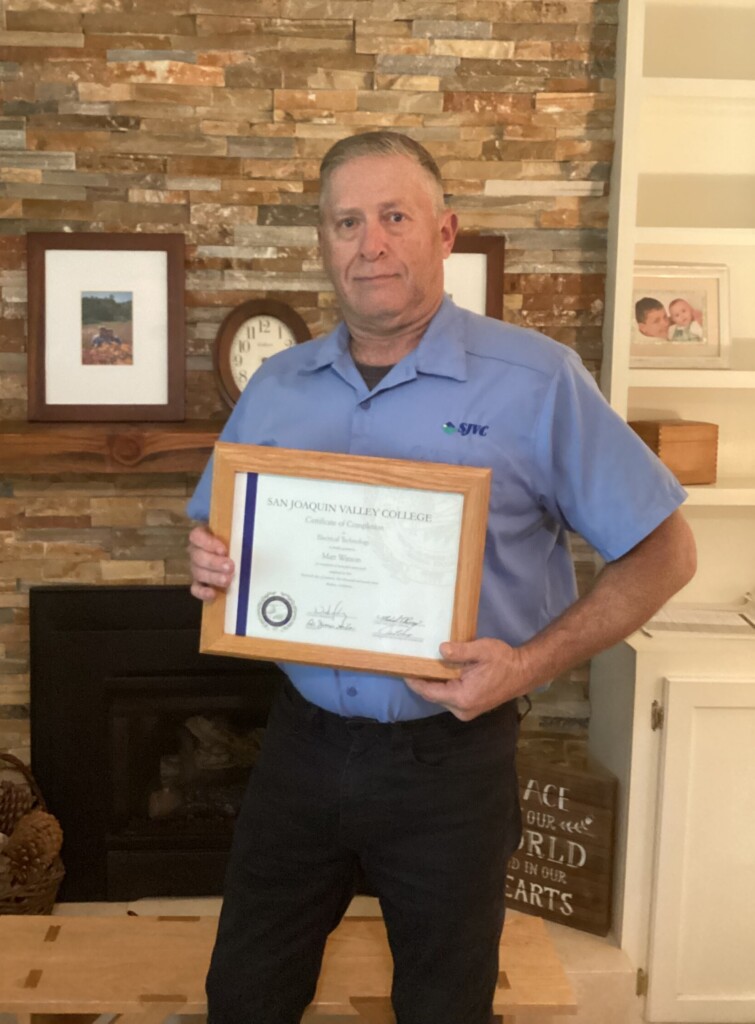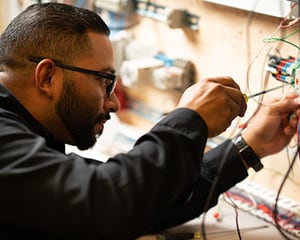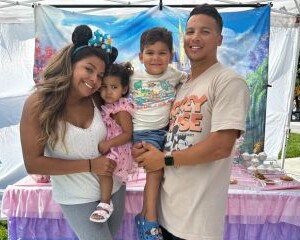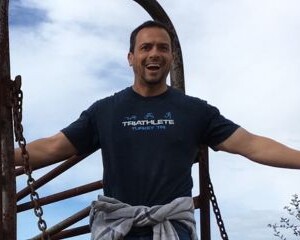Grad Q&A with Electrical Technology Graduate Matt Watson
 After working 35-years as a meat supervisor for a grocery chain Matt Watson wanted to make his move to a more independent and lucrative career.
After working 35-years as a meat supervisor for a grocery chain Matt Watson wanted to make his move to a more independent and lucrative career.
He went bold – opening up his own handyman business. And because Matt has a strong work ethic, a good understanding of the mechanics of how things work and well-honed customer service skills, he could be reasonably successful. But he soon discovered that something important was missing from his business’s toolbox: electrical knowledge and experience. And he was determined to fix that.
What pushed you to expand your business to include electrical repair?
That’s what I saw the demand for and that’s what most fascinated me.
I found that most of the repairs my customers wanted involved electrical. They might fix their own kitchen sink, but they won’t touch wire plugs; electricity can hurt.
Electrical expertise went to the top of my list and in order to be ‘legal’ you have to be certified.*
Why choose SJVC’s Electrical Technology program?
I researched several area programs online and SJVC seemed a good fit for me.
During my initial visit at SJVC (Modesto campus) I met with three different people: admissions advisor, financial aid officer and a career services advisor. The entire staff was amicable and informative from the beginning. Instructors were highly knowledgeable and broke down complex concepts into manageable pieces. My wife, Christine, was with me and she felt as good about it as I did.
What was the biggest surprise about the Electrical Technology program?
I honestly didn’t realize how much math was in electricity. It’s intimidating in theory, but in reality, it’s not. It’s a simple formula and once you have that, it’s simple to figure out.
I had to relearn math concepts, so I leaned into the collective knowledge of my classmates, instructors and even a few family members.
What was your greatest struggle in class?
We didn’t have computers when I was last in school, so doing everything online was a bit of a curve for me. It wasn’t difficult, just unfamiliar. Within a couple of weeks, I had it dialed in. I ended up with a 4.0 GPA.
At first, I didn’t feel that comfortable walking into a classroom with a bunch of 18-20 year olds. But after I was there for two classes, I realized that I had dealt with people that young who had worked for me and I became a kind of mentor. They had me on math and I helped them out with technology – the real world of wiring and things like that. I made a lot of good friends there.
Did you get enough instructor, faculty, family support?
Tons of support. Marco Sanchez and Christopher Roberts (instructors) were highly knowledgeable. They delivered instruction that made curriculum accessible. Victoria Krayna (Career Services) brought me into the 21st century with her knowledge, resources and career advice. Her connections in the community and with prospective employers were invaluable.
Christine supported our family while I was in school. As a public school teacher, she is an advocate for education and showed me that with hard work, there is always time to make a change. Our oldest son, Colten, tutored me in technology and advance math concepts and our younger son, Nathan, pitched in with household chores and cooking. The credit belongs to our team.
What was one of your favorite moments in the Electrical Technology program?
We had a substitute teacher who made a simple electrical drawing on these practice boards with electrical boxes that we practiced wiring on. He drew a circuit with length, width, light and a power source and told us to wire it. I was done in five minutes. It was something I’d done before but my fellow students had no clue because we hadn’t been taught that yet. So, I walked around the room and helped everybody. It cemented some friendships that lasted throughout the course.
I was always interested in what we were learning and I wanted to see what was around the corner, what the next class would bring. It was fast-paced learning; there was no time to get bored with it.
What advice do you have for any student that struggles?
If you sit there and don’t say a thing, instructors don’t know that you don’t get it. You have to be able to say, ‘Explain that again, please.’
I had a couple of fellow students who sometimes weren’t having a great experience in the program. But that’s because they weren’t putting that much into it. You get what you give. Your job is to absorb and learn; that’s what you signed up for. And SJVC really holds up their end of it.
What was the best thing about the program for you?
It sounds corny, but the best thing for me was realizing that you’re never too old to learn – and that learning can be fun. I learned that no matter your age, you should never give up on your goals; and many people are willing to help you be successful.
In high school you don’t necessarily see the value to why you’re learning something. But when you’re studying something because that’s what you’re interested in and can see where you can apply it, that makes it different.
Was this education effort worth leaving a 35-year career?
My dad had the same job for 50-years, but times have changed. There’s not a big reward at the end. You walk out the door and someone else fills your shoes. All your employer owes you is a paycheck and all you owe them is an honest day’s work.
I feel that with my education now, I’m not trapped, I’m in demand. My field is in demand. That gives me options, power, growth.
How did your job search unfold?
Victoria (Career Services) works with employers who are needing people. So, when I’d send a resume, I’d hear back within 2-3 days.
My thinking was, ‘I’m 59-years old; employers don’t want somebody my age.” I got three job offers in one day. I picked the one that I thought was the best fit, the one where I got the best feeling when I went for the interview.
I started my job before I finished school, and they were very supportive of me finishing the program.
What are your current job responsibilities?
I’m an electrical maintenance technician and typically run service calls all day long. Agriculture wells and water pumps to residential jobs with lack of power, bad wiring, pressure switches and starter motors.
I don’t think with electrical you can ever know everything: anomalies, diagnosing electrical problems is a process. You start with the knowns and figure out the unknowns. It’s a puzzle, and that’s what makes it interesting to me. You get better and better at it.
What is your vision for the future?
If the challenge isn’t there for me, I’ll move on. It is so interesting to me that the part I enjoy most is the fact that I don’t know it all. Everything I can learn makes be become that much more valuable.
*In order to be certified as a General Electrician in the State of California, pursuant to certification standards established by the Division of Labor Standards Enforcement, an applicant must pass a certification examination and complete 8000 hours of work for a C-10 electrical contractor installing, constructing or maintaining electrical systems covered by the National Electrical Code. For additional details, please visit: dir.ca.gov/dlse/ECU/ElectricalTrade.html.
You might also like
More stories about
Request Information
All fields using an asterik (*) are required.


